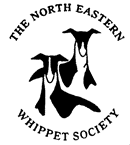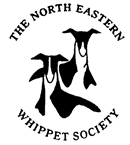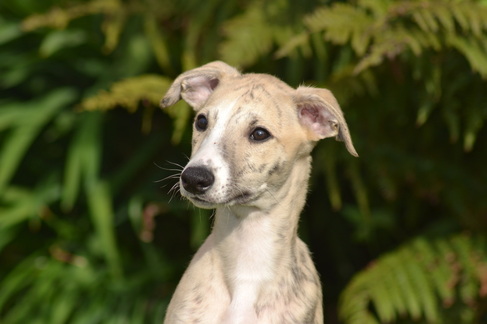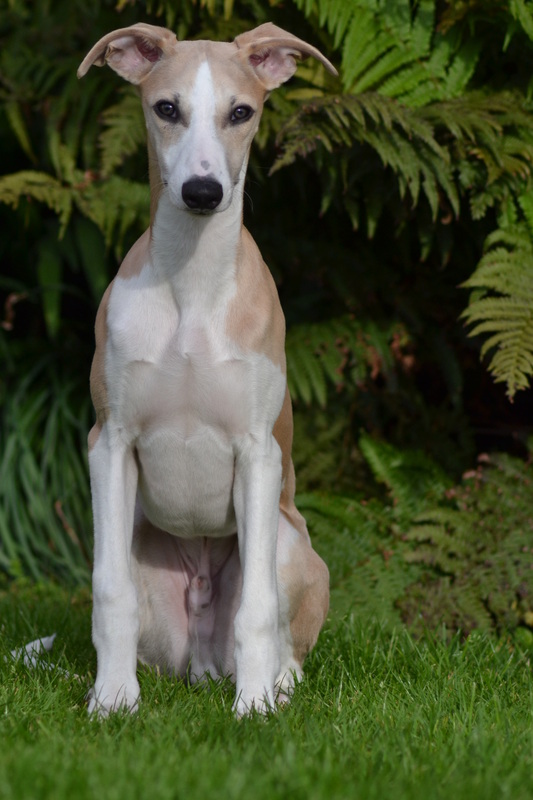Is a whippet right for me?

- See Whippet Breed Characteristics on the home page.
- Most people are happy to talk about their pets, so if you see a whippet out and about locally, stop and talk to the owner about what its like living with one.
- If there is a dog show near you there are quite likely to be whippets - again pop along and chat to some whippet owners.
- Contact a breeder for a chat, they may well have a litter or know where there is a litter, and should always be happy to chat about their dogs.
- Visit your local veterinary surgery, the staff there should be able to offer advice and people to contact.
- There is a wealth of information on the Kennel Club website about all registered breeds of dog.
- Contact our Secretary, Paul Glaholm or our Chairman Jo Beckett-Hughes (see the Committee & Contacts page)
Choosing a breeder
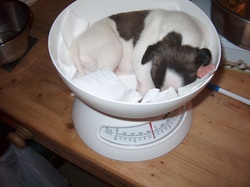
So, now that you have decided a whippet is right for you and your family circumstances, it is time to think about finding a breeder. Always investigate the breeder of your new puppy. Make sure that the puppies are reared in a home environment and that you can see the mother, (fathers are quite often absent if not owned by the breeder). Be very wary of buying from a breeder where the mother and puppies are kept in an outside building. Do not under any circumstances buy from a breeder who will not show you the mother and/or offers to meet you somewhere in public to hand over a previously unseen puppy. We must try to put puppy farmers out of business and ensure that only happy, healthy, well adjusted puppies become the next generation. If you buy from a breeder who advertises on the internet, asks for money in advance and promises to deliver the puppy by a pet transport company, then you are likely to lose that money and have no puppy. It is far better to wait for a puppy that you can see first and meet the breeder and the mother of the puppies, rather than rushing into an ill-advised purchase. The right puppy for you is out there somewhere.
If you have any doubts about a breeder, the condition the puppies are kept in, the health of the mother, or any other dogs kept by the breeder, do not buy a puppy, but inform the police or RSPCA straight away for action to be taken under the auspcies of the Animal Welfare Act. If they're genuine they'll have nothing to hide.
Above all DO NOT buy a puppy from a pet shop - yes there are shops out there with puppies in cages!
If you have any doubts about a breeder, the condition the puppies are kept in, the health of the mother, or any other dogs kept by the breeder, do not buy a puppy, but inform the police or RSPCA straight away for action to be taken under the auspcies of the Animal Welfare Act. If they're genuine they'll have nothing to hide.
Above all DO NOT buy a puppy from a pet shop - yes there are shops out there with puppies in cages!
The 'Small Print'
OK, so you've decided on the breed for you, found a breeder with a litter of puppies and either chosen your puppy or the breeder has offered you one in particular. The next thing you need to do is make sure that all the paperwork is in place.
The breeder should comply with our Code of Ethics ie they should provide you with a diet sheet and the Kennel Club Transfer Certificate. If there are any endorsements on the Registration Certificate for your puppy these should be explained to you and you may be asked to sign to say that you have understood these endorsements. The breeder should also undertake to provide guidance to you on most aspects of your puppy's upbringing and care in the future. If your breeder is not a member of NEWS, still look for the breeder complying with the code of ethics as a benchmark of a caring breeder.
If your breeder is a member of the Kennel Club Assured Breeder Scheme then he/she is subject to the Scheme's Requirements and Recommendations, full details of which can be found on the Kennel Club's Assured Breeder Scheme Requirements and Recommendations page - follow this link: KC ABS Requirements and Recommendations. For you, as a puppy buyer, this means that you should be provided with:
The breeder should comply with our Code of Ethics ie they should provide you with a diet sheet and the Kennel Club Transfer Certificate. If there are any endorsements on the Registration Certificate for your puppy these should be explained to you and you may be asked to sign to say that you have understood these endorsements. The breeder should also undertake to provide guidance to you on most aspects of your puppy's upbringing and care in the future. If your breeder is not a member of NEWS, still look for the breeder complying with the code of ethics as a benchmark of a caring breeder.
If your breeder is a member of the Kennel Club Assured Breeder Scheme then he/she is subject to the Scheme's Requirements and Recommendations, full details of which can be found on the Kennel Club's Assured Breeder Scheme Requirements and Recommendations page - follow this link: KC ABS Requirements and Recommendations. For you, as a puppy buyer, this means that you should be provided with:
Taking your puppy home
When the moment finally arrives to take your puppy home, ask the breeder for a piece of bedding or a toy to take with him, just something little to remind him of his litter mates and his mum, and to help him with the readjustment he needs to be settled in his new home. There are 2 areas that you will need to address immediately he comes home:
Training and socialising are very important and can head off problems before they arise. So do find yourself a good local training club and start as you mean to go on with a happy, well behaved, dog.
- Sleeping arrangements: Decide where he is to sleep from day 1 and he'll soon get used to the fact that it is his space. When you put him to bed he must stay there and go to sleep. If he cries do not return to him once you have put him to bed and turned out the lights. It may seem hard but if you keep going back to him, he will continue to cry for attention. Whippets are highly adaptable little dogs and he will soon get used to the nightime routine.
- Toilet training: Puppies will need to visit the garden after eating, sleeping and playing and at the very least ought to given an opportunity every 2 hours. So, immediately after each of these events, take him to the garden and say "go wee wees", as soon as he does give him lots of praise "Good boy, well done, go wee wees" he will then associate those words (or which ever words you choose to use) with performing a wee wee.
Training and socialising are very important and can head off problems before they arise. So do find yourself a good local training club and start as you mean to go on with a happy, well behaved, dog.
Frequently Asked Questions
Q: How do I train my puppy?
A: The mainstay of training any dog is consistency of handling. You must decide what is allowed and what isn't, and all those handling the puppy must be consistent on these matters. If you don't want the puppy on the furniture, do not allow him up at any time - he will soon learn that he is not allowed up. However, if Dad doesn't let him up but Mum does, the poor puppy will be confused as to what is acceptable and what isn't. The same applies to going upstairs, begging at meal times, pulling on the lead....the list is endless. Find yourself a local dog training club and take your puppy along as soon as he is free of his injections. When they are young, like children, they have a short span of attention and easily get bored so don't expect too much of a young puppy. Make sure your trainer is registered and they will have the experience to know when your puppy is old enough to concentrate more.
Q: Will my puppy chew?
A: More than likely! Whippets are no different to any other dog and you can guarantee that if you leave something important within reach, it will be the one thing that gets chosen to be chewed! Things that smell of you are usually favourites and mine have had mobile phones, glasses and remote controls! Providing your puppy with plenty of toys and chew bones can help him to satisfy the need to chew although this is not infallible. Making sure that you are relatively tidy and that important things are out of reach will help. Bored dogs look for mischief, so don't leave him alone for too long. If you need to leave him, get a ball that you can hide food in which will keep him entertained whilst you are out.
A: The mainstay of training any dog is consistency of handling. You must decide what is allowed and what isn't, and all those handling the puppy must be consistent on these matters. If you don't want the puppy on the furniture, do not allow him up at any time - he will soon learn that he is not allowed up. However, if Dad doesn't let him up but Mum does, the poor puppy will be confused as to what is acceptable and what isn't. The same applies to going upstairs, begging at meal times, pulling on the lead....the list is endless. Find yourself a local dog training club and take your puppy along as soon as he is free of his injections. When they are young, like children, they have a short span of attention and easily get bored so don't expect too much of a young puppy. Make sure your trainer is registered and they will have the experience to know when your puppy is old enough to concentrate more.
Q: Will my puppy chew?
A: More than likely! Whippets are no different to any other dog and you can guarantee that if you leave something important within reach, it will be the one thing that gets chosen to be chewed! Things that smell of you are usually favourites and mine have had mobile phones, glasses and remote controls! Providing your puppy with plenty of toys and chew bones can help him to satisfy the need to chew although this is not infallible. Making sure that you are relatively tidy and that important things are out of reach will help. Bored dogs look for mischief, so don't leave him alone for too long. If you need to leave him, get a ball that you can hide food in which will keep him entertained whilst you are out.

